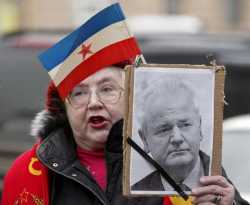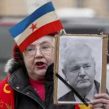
RUSSIAN REACTION TO MILOSEVIC’S DEATH REVEALS RIFT BETWEEN KREMLIN AND THE WEST
Publication: Eurasia Daily Monitor Volume: 3 Issue: 52
By:

The controversy over the death of former Yugoslav strongman Slobodan Milosevic laid bare the deep-seated uneasiness in relations between Russia and the West. The Kremlin appears bent on taking advantage of Milosevic’s demise in the same way it tried to make use of his actions in the past, but what the Russian policymakers are really concerned about are their own political interests.
As the West is stepping up criticism of Moscow’s rollback of democracy and its highhanded policy towards the former Soviet republics, the Russian leaders have likely decided that Milosevic’s death is an opportune moment to launch their ideological counteroffensive. The recent statements by Russia’s top government officials and senior lawmakers clearly demonstrate Russian President Vladimir Putin’s determination to flex his muscles, some analysts suggest.
On March 13, Russian Foreign Minister Sergei Lavrov told reporters that, since the International Criminal Tribunal for the former Yugoslavia (ICTY) had rejected Milosevic’s application to receive medical treatment in Moscow, Russia wanted to carry out its own probe into his death. “In fact, Russia was not trusted. In a situation when we were not trusted, we also have a right not to trust,” Lavrov said. Russia’s top diplomat also confirmed that his office had received Milosevic’s letter, in which he complained of being given strong medicines used to treat tuberculosis and leprosy. (Two weeks ago the UN tribunal ruled that Milosevic could not travel to Moscow despite Russia’s assurances that he would return to The Hague to complete his trial.)
According to one well-informed source, top Russian officials “were insulted by having their guarantees rejected” by the Hague tribunal, and were now “gloating over the delicate situation the tribunal finds itself in.”
At the March 13 session of the Russian State Duma, most legislators blamed Milosevic’s death on the UN tribunal and the Serbian authorities who originally handed him over to The Hague in 2001. In the opinion of Konstantin Kosachev, chairman of the State Duma International Affairs Committee, the ICTY cannot be regarded as an objective court of law because of its pronounced “anti-Serbian bias.” The UN tribunal, the lawmaker contends, is trying to portray the Serbian people and its former leaders as the main culprits “responsible for the tragedy that befell the peoples of the former Yugoslavia.” He also said the Duma would shortly adopt a resolution criticizing the Hague tribunal over what he argued was its anti-Serbian stance and for not allowing Milosevic to travel to Moscow.
Both the Russian political class and the broad public were strongly against the 1999 NATO operation in Yugoslavia aimed at stopping what the West claimed was the ethnic cleansing of Albanians in Kosovo. It would seem that now the Kremlin has decided to whip up anti-Western and anti-American sentiments within the Russian population, which was generally sympathetic to Milosevic’s role in opposing NATO in the Balkans. “Many citizens of our country don’t believe in the genocide of the Albanian people. Milosevic remained in the memory of the majority of Russians as the leader of the proud independent state that the American [war] machine had failed to crush,” contends Valery Fedorov, general director of VTsIOM, the Kremlin-connected polling agency.
Independent experts also confirm that the level of anti-American feelings in Russia is running high. The polls conducted by the Levada Analytical Center reveal that over the decade almost one-third of respondents have taken an extremely critical stance toward Washington’s foreign policy.
Although nowadays anti-Americanism is not an exclusive characteristic of Russian public attitudes but rather a global trend, Russia’s negative perceptions of Washington’s policies have peculiar features.
First, having been America’s main adversary for over half century, Moscow finds it particularly difficult to adjust to its curtailed global role and Washington’s seemingly unassailable supremacy. Seeking to limit what it sees as American hegemony, the Kremlin often finds itself in the company of some unsavory allies, not infrequently outright “rouges,” only because those leaders are believed to be capable of standing up to the American might. Remarkably, some analysts draw parallels between Russian attitudes toward Milosevic and Moscow’s strategy toward Iran. The Kremlin clearly does not want to see the clerical regime in Tehran armed with nuclear weapons, but at the same time, it treats Iran’s leadership, as it did Milosevic, as a potentially useful ally acting as a counterweight to the American presence in the region.
Second, the Russian leadership is using the anti-Western and anti-American sentiments to further their domestic political agenda. The government sees the public wariness of the West as a handy instrument for manipulation and mobilization. The Kremlin likely regarded Milosevic’s death as a convenient pretext to step up anti-Western propaganda. In this sense, it is symptomatic that the coverage of Milosevic’s death on Russian state-controlled television was overwhelmingly sympathetic toward the late Yugoslav leader, with several commentators defending him and blaming his captors for his death.
(Gazeta, Moscow Times, Strana.ru, March 14, Kommersant, Vremya novostei, Prognosis.ru, March 13, RTR Russia TV, March 11)




